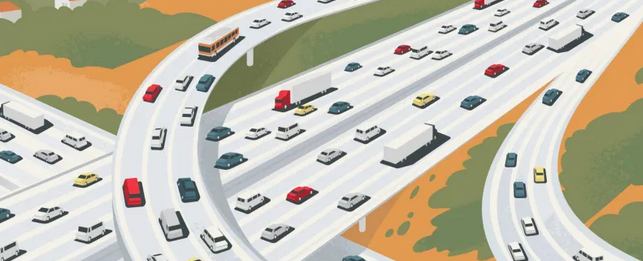Yesterday, the San Gabriel Valley Council of Governments voted to support proposed Metro Highway Program guidelines that increase flexibility for projects to include complete streets features.
Based on language voters approved in Measures R and M, the Metro Highway Program has been very strict about what features are allowed as part of "highway" projects. Note that while the title of the program is Highway, many projects are located on city streets. The Metro board is interested in allowing "highway" projects, where appropriate, to build complete streets. The proposed new project eligibility rules would allow allow cities the flexibility to incorporate multi-modal components - such as busways, bikeways, and sidewalks - but do not require they be included.
Last week, the San Gabriel Valley Council of Governments (SGVCOG) Public Works committee had been pretty negative about Metro's proposed changes. At that meeting, SGVCOG Chief Engineer Mark Christoffels had characterized the proposal as hijacking. City of La Verne Director of Public Works Dan Keesey was even less generous, telling Metro to "eff off.”
The nonprofit ActiveSGV urged the SGVCOG to support Metro's proposal, noting:
When Metro Highway Funding is used on local streets, it impacts all roadway users, including older adults, children, and mobility-impaired residents who walk along and across streets to access local schools, community sites, and businesses. Transportation “improvements” should not make local streets more difficult or dangerous to cross by foot. This is particularly important in Los Angeles County, where traffic crashes are the number one cause of premature death for children aged 5-14, and number two cause for children 1-4, young adults 15-24, and adults 25-44.
As part of the ongoing 710-N reallocation process, Metro Highways staff has not permitted San Gabriel Valley cities to utilize funding for pedestrian safety, transit, and multi-modal projects, despite corridor cities requesting over $200 million in such projects.
Yesterday, cooler heads prevailed at the SGVCOG's Transportation Committee (archived at YouTube).
At the Transportation Committee, Christoffels did a reversal from his critical comments at the earlier Public Works TAC meeting, stating, "There's some misconceptions out there that the COG staff was opposed to [the new eligibility rules]. We're not." That said, he continued by describing highway mobility as "traditional" and "bike and pedestrian and other first and last mile complete streets" as "non-traditional" and "the newer types of mobility being contemplated." This despite the fact that both walking and biking predate motorized vehicles.
Christoffels asserted that changing Measure R eligibility "doesn't really impact" the San Gabriel Valley. He urged that in future Measure M SGV calls for projects, the COG and cities would need to "maintain some sort of discipline," essentially recommending freezing SGV into (car-centric) categories negotiated in the run-up to the 2016 Measure M.
Christoffels assertions were aptly countered by South Pasadena City Councilmember Diana Mahmud, who stated:
Actually this does affect San Gabriel Valley cities, in particular those that are the recipient of the remaining funds that remain from Measure R SR-710 project gap closure. We have had some difficulty with Metro in having some of our proposed projects approved. In our view, staff is taking an unduly narrow perspective on the use of those funds. And so we are in fact, I think, adversely affected by the present statement of the guidelines and I believe we would benefit from a revision to the guidelines...
Mahmud emphasized that all Metro's proposal would do is provide flexibility, "You don't have to avail yourselves of that flexibility but the flexibility would be there." She termed the proposal "more progressive" and "more friendly to our environment." She urged support for the proposed revisions to give communities the flexibility to address future changes to transportation patterns, citing the unprecedented drought and pandemic, not anticipated in the lead up to Measure M.
City of Glendora Transportation Superintendent Steven Mateer echoed a lot of South Pasadena's concerns. He asserted that the proposed changes "are really just aligning the Highway Program with what it should have been" and that they would keep the guidelines current, and not stale.
Metro boardmember and Duarte City Councilmember John Fasana commented that "complete streets [and] first/last miles were definitely mentioned in the [Measure M] ordinance" and that he did not think "it really does any harm to the San Gabriel Valley."
Fasana moved that the committee support the proposed new guidelines "with the provision that their adoption does not adversely affect scheduled project delivery for projects in the San Gabriel Valley." He clarified that "right now, timing wouldn't be affected," but stressed that the changes should not re-open debates about shifting funding between sub-regions, nor immediately reopen SGVCOG allocations outside of the designated every five year process.
The Fasana motion passed unanimously. Later in the afternoon, it also passed on the consent calendar of the SGVCOG Governing Board meeting.
The changes are still being discussed by the various Councils of Governments throughout L.A. County, and are expected to come to a vote at the Metro board early next year.






